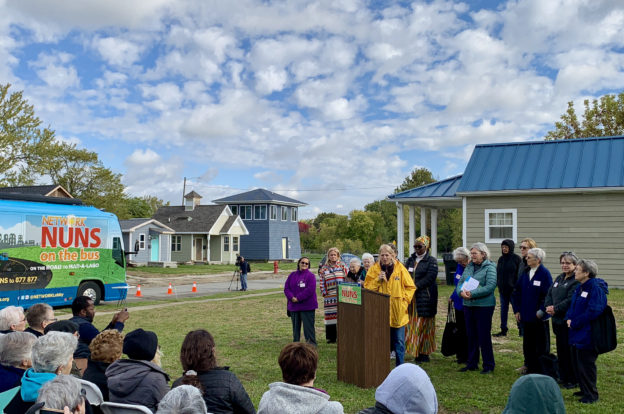
Keeping the Momentum for Affordable Housing
Siena Ruggeri
December 28, 2018
During NETWORK’s journey across the country , we were energized by the many community organizations we encountered that are doing fantastic work reducing homelessness and housing instability. In Detroit, we met Cass Community Social Services, an organization that bought three blocks of land in their neighborhood to build tiny homes for low-income community members. In Miami Beach, we saw how the Elderly Housing Development and Operations Corporation develops and manages housing for seniors. These apartments provide vital spaces for seniors; the average wait time for seniors in need of affordable housing is four to eight years. The Women’s Community Revitalization Project develops affordable housing for women and families in Philadelphia, a city coping with opioid addiction and housing instability, and we were able to see their tangible impacts in their community.
Direct service providers across the country are implementing creative solutions to housing instability, but their efforts are not adequately supported in Washington. These communities rely on federal funding and tax credits. We must connect the work being done at a community-level to our federal housing policies. The federal government’s approach to housing has barely budged for decades—solutions that were prescribed in the 1960s are insufficient to meet the complex challenges of housing in the 21st century.
Only 1 in 4 people who qualify for federal housing assistance receive it. Once they obtain a Section 8 voucher, it’s another battle to find a landlord who will accept the voucher. This is an antiquated system and an affordable housing supply that is dwarfed by the magnitude of the housing crisis. A minimum wage worker can afford a one-bedroom at a fair market rate in only 22 out of more than 3,000 counties nationwide. It’s not a small minority that’s struggling to find an affordable place to rent. Teachers, college graduates, and white collar workers alike are struggling to find housing. With the middle-class feeling the pinch, low-income families who have always struggled with secure housing are pushed out even farther. With wages stagnant, someone can have a full-time job and still not be able to keep up with rapidly rising rent prices.
Our nation’s lack of investment in housing exacerbates social inequalities and widens the racial wealth gap—housing is a key means to acquiring generational wealth. It is unfortunate the housing crisis has only recently been emphasized in the media because it now impacts people outside of traditionally housing insecure groups. It does present an opportunity to demand our legislators give the housing struggle their attention.
There is legislative momentum building on the idea of affordable housing. The 115th Congress included the Rent Relief Act, a bill introduced by Senator Kamala Harris that would assist renters who spend more than 30% of their income on rent. Senator Elizabeth Warren introduced the American Housing and Economic Mobility Act, which would invest $445 billion dollars in the national Housing Trust Fund over 10 years, providing resources to build housing for the lowest-income households. The bill also expands protections against housing discrimination, provides down payment assistance to first-time homebuyers living in formerly redlined or officially segregated areas, and includes local incentives to reduce the cost of middle-class housing. Senators Maria Cantwell and Orrin Hatch introduced the Affordable Housing Credit Improvement Act, which expands the low income housing tax credit (LIHTC) by 50%, enabling the construction of more homes for people with extremely low incomes.
While there are innovative ideas being introduced, those ideas are not making it to the finish line of being passed into law and actually impacting real lives. With the shadow of the 2020 elections looming over Congress, affordable housing could easily be seen as simply a messaging tool to strengthen congressional resumes before the primaries. Housing demands urgency and action in order to advance meaningful legislation in the next Congress. While our new Congress looks hopeful, it is only as good as the legislation it produces on issues that directly impact families and communities in our country.
There is also an opportunity to advocate for affordable housing via the budget process. Congress has yet to pass a spending bill for 2019. The Department of Housing and Urban Development budget proposed by the Senate ensures that HUD does not have its funding cut further. If Congress does not pass an updated HUD budget, housing will be funded by a continuing resolution. Since a continuing resolution does not reflect market-rate rents, housing programs would face deep cuts. Any cut to HUD funding decreases the government’s ability to serve people who depend on assistance for affordable housing, including seniors, people with disabilities, families with young children, and people experiencing homelessness or people on the verge of homelessness. Congress needs to pass a budget for the 2019 fiscal year that adequately funds key programs that protect vulnerable groups from homelessness.







